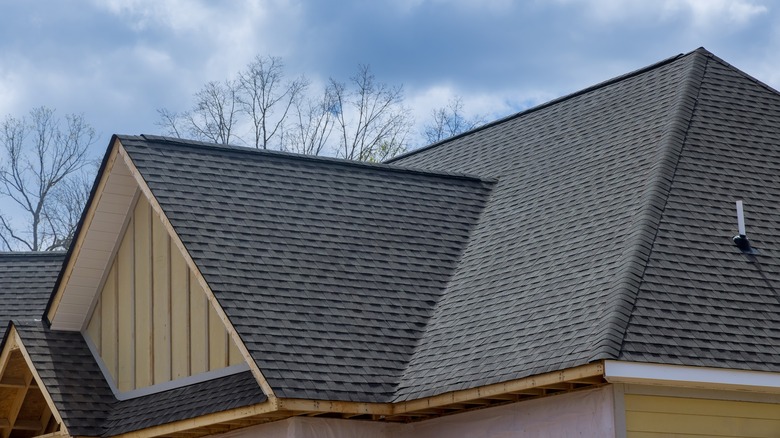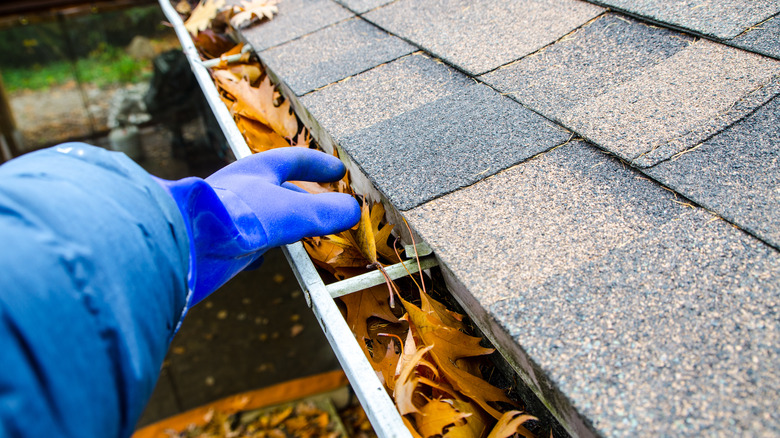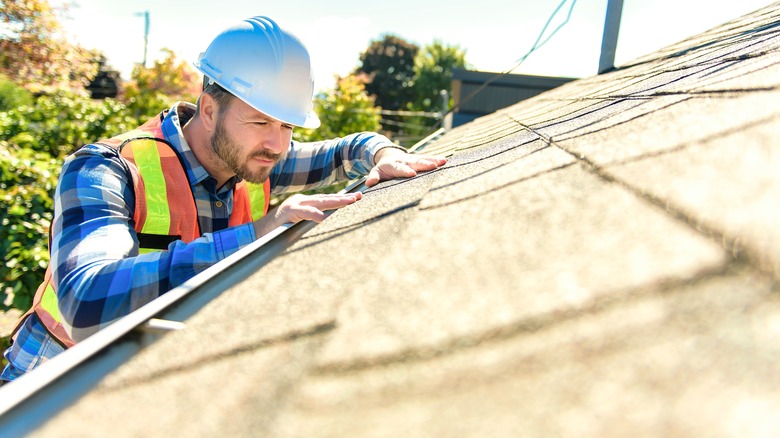Our Roof Repair Expert's Best Tips For Extending The Life Of Your Roof
Although it would be nice if roofs lasted forever, regardless of the weather, we all know that's not the case. Many roofs are built to withstand a range of conditions like strong winds, heavy rain, hail, and small tree debris, but sometimes mere neglect is the main culprit in shortening their lifespan. In an exclusive House Digest interview, Andre Afsharian, owner of Roof Repair Specialist in Los Angeles, shared some tips to avoid that scenario: " ... maintaining a clean roof, applying appropriate protective treatments, and conducting regular inspections are key strategies to prolonging the life of a roof."
In the United States, asphalt shingles are the most popular roofing material for a home. Roofs made with this material can last up to 25 years. Those made with slate, tile, or copper, however, can last twice as long or longer, if you're willing to cough up more money for the materials. Regardless of the average maximum lifespan for specific materials, improper care can cut that number down, especially if you live in an area prone to extreme weather. However, understanding your roofing material is still important, as Afsharian emphasizes that the specific approach to roof maintenance must be customized to the material used. "Tailoring the maintenance approach to the specific type of roofing material ensures that the roof remains in optimal condition for as long as possible, ultimately safeguarding the home against the elements," he explains.
Maintain your roof regularly, and consider adding extra protection
Most things in life last longer when you take care of them on a regular basis — shoes, cars, our bodies, and yes, the roofs on our homes. "Extending the life of a roof primarily involves proactive maintenance, which can vary significantly based on the type of roof material," Andre Afsharian reveals in an exclusive interview with House Digest. This proactive maintenance includes keeping the roof and gutters free from debris in the form of leaves, branches, acorns, and other items that can prevent proper water flow. Over time, this obstruction can trap moisture and cause the roofing materials to deteriorate. It can also lead to moss or algae growth.
One aspect of roof maintenance includes adding an extra layer of protection. "For specific types of roofs, additional measures might include applying protective coatings or rejuvenation products designed to enhance the roof's resistance to weathering, UV damage, and moisture," Afsharian explains. "These products can significantly extend a roof's lifespan by providing an extra layer of protection against the elements, reducing the rate of wear and tear." This coating can be in the form of a protective sealant for asphalt shingles and a rust-prevention application for metal roofs.
Ensuring that your roof is free of clutter, and using the proper protective coating to maintain it can ultimately help ensure optimum defense against the elements. The greater the protection, the longer the roof will last.
Have your roof professionally inspected annually
Spotting and removing debris on a roof is fairly easy, but a professional roofer can do a lot more by conducting a thorough inspection. "Regular inspections are also a cornerstone of roof maintenance," Andre Afsharian tells House Digest exclusively. "Having a professional inspect your roof at least once a year can help identify potential issues before they escalate into costly repairs." For example, a roof inspector can find and repair or replace damaged, missing, or loose shingles to extend the lifespan of your roof.
Afsharian says that when it comes to new roof installation, choosing the right materials plays a major role in the roof's longevity. "The most durable roofing material is arguably slate, accompanied by copper and lead flashing," he shares. These materials can last many decades or even more than a century, according to Afsharian, but they cost five to 10 times more than asphalt shingles. Afsharian also recommends thinking carefully about which installer you'd like to hire, in addition to considering which material to use: "One of the biggest mistakes when it comes to roofing is the over emphasization of the roofing material as opposed to the installer. If 80% of the effort is given to choosing the right contractor or tradesman, the question of 'what material is best' almost solves itself."
Remember, with regular maintenance, extra protection, and annual professional inspections, you can extend the life of your roof and delay the need for full replacement. And if you're in a position where a full replacement is already needed, a slate roof, or roofs made from copper or tiles, offer the most durability — if you can afford it.


